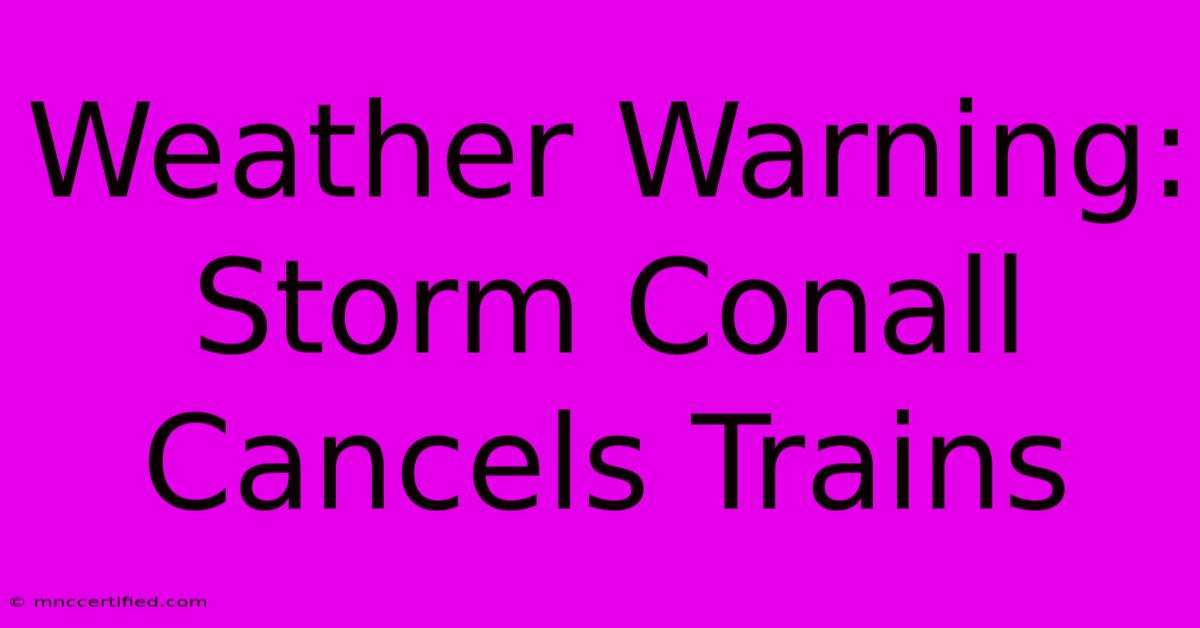Weather Warning: Storm Conall Cancels Trains

Table of Contents
Weather Warning: Storm Conall Cancels Trains
Storm Conall has wreaked havoc across the country, bringing with it high winds, heavy rain, and widespread disruption. One of the most significant impacts has been the cancellation of numerous train services, leaving thousands of passengers stranded and facing significant travel delays. This article details the extent of the disruption caused by Storm Conall and offers advice for affected travellers.
Storm Conall's Impact on Rail Services
The ferocity of Storm Conall has proven too much for many rail networks. High winds have caused significant damage to overhead lines and signalling systems, resulting in widespread cancellations and delays. Many train operating companies (TOCs) proactively cancelled services in anticipation of the storm's impact, while others were forced to suspend operations after encountering damage. This has led to significant disruption for commuters and long-distance travellers alike. Specific lines affected include (but are not limited to):
- [Insert Specific Affected Lines Here – e.g., Great Western Railway, London Northwestern Railway] - These lines experienced [mention specific issues - e.g., significant delays, complete suspension of services, damage to infrastructure].
- [Insert Specific Affected Lines Here – e.g., Southeastern, Northern Rail] - These lines suffered [mention specific issues – e.g., fallen trees blocking tracks, damage to overhead power lines].
Checking Train Status During Severe Weather
It's crucial to check your train's status before embarking on your journey during severe weather events like Storm Conall. Reliable sources for checking disruptions include:
- National Rail Enquiries: This website ([link to National Rail Enquiries]) and app provide real-time updates on train services across the UK.
- Individual Train Operating Company Websites: Check the website of your specific train operating company for the most up-to-date information on your route.
- Train Station Information Boards: If you're at a station, check the digital information boards for the latest service updates.
Dealing with Cancelled Trains Due to Storm Conall
Finding your train cancelled due to severe weather can be incredibly frustrating. Here's what you can do:
- Check for alternative routes: Consider using alternative transport options, such as buses or coaches, if they are available. Many bus companies run services to major rail hubs.
- Contact your train operating company: If your train is cancelled, contact your TOC to inquire about refunds or rebooking options. Many TOCs offer flexible rebooking policies during severe weather events.
- Check your travel insurance: If your journey is significantly delayed or cancelled, check your travel insurance policy to see if you're covered for any expenses incurred, such as accommodation or alternative transport.
- Stay informed: Keep an eye on weather forecasts and official updates from your TOC and National Rail Enquiries for the latest information on service resumption.
Safety Precautions During Storm Conall
Safety should always be your priority during severe weather. Avoid unnecessary travel if possible. If you must travel, be aware of the potential hazards, including:
- High winds: Be careful near trees and buildings, and avoid walking near railway lines.
- Flooding: Do not attempt to cross flooded areas on foot or in a vehicle.
- Falling debris: Be aware of the potential for falling branches or other debris.
Looking Ahead: Preparing for Future Storms
Learning from the disruption caused by Storm Conall is crucial. Improved communication, contingency planning, and better infrastructure resilience are vital to minimize the impact of future storms on rail services. This includes investing in more robust infrastructure capable of withstanding extreme weather conditions and improving real-time communication with passengers.
This article aims to provide comprehensive information regarding Storm Conall’s impact on train services. However, it's always recommended to check official sources for the most up-to-date information. Remember, safety is paramount during severe weather events.

Thank you for visiting our website wich cover about Weather Warning: Storm Conall Cancels Trains. We hope the information provided has been useful to you. Feel free to contact us if you have any questions or need further assistance. See you next time and dont miss to bookmark.
Featured Posts
-
Coote Addresses Yellow Card Claims
Nov 28, 2024
-
Investment Banks Columbus Ohio
Nov 28, 2024
-
Wall Street Guide To Investing
Nov 28, 2024
-
Euro Millions Uk Player Wins 177 Million
Nov 28, 2024
-
Oriental Trading Company Kites
Nov 28, 2024